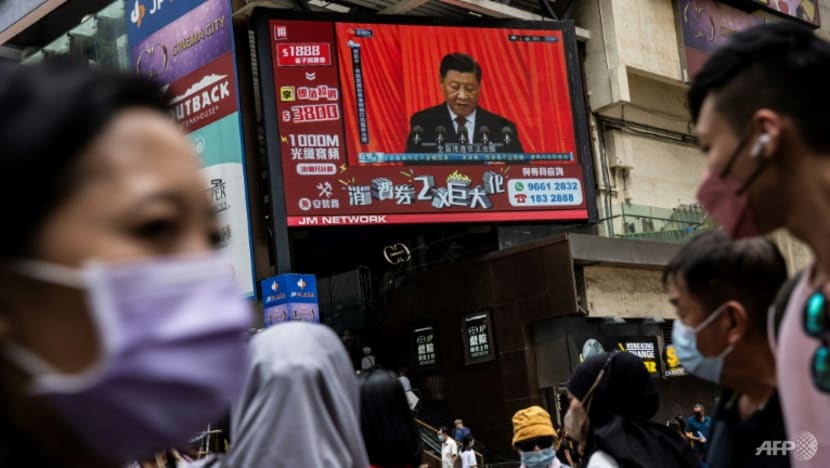Commentary: How will China interact with the world in the next 5 years? Xi’s congress speech holds clues
Xi Jinping’s remarks at the 20th Communist Party Congress suggest China is unlikely to embrace rapid foreign policy changes – yet it won’t be quiet in the international arena either, says an academic.

PERTH: The 20th National Congress of the Communist Party of China, currently underway in Beijing, is China’s most significant political event in half a decade.
Like the pre-election leaders’ debates in Western democracies, the party congress, held once every five years, provides valuable opportunities for us to learn more about the country’s political leaders and their policies.
It’s unlikely any heated political debate will occur during the congress, as most political arrangements are made behind the scenes beforehand. However, the general secretary’s report to the party congress often sets the tone of what China’s leadership will prioritise in the coming years.
Over the weekend, President Xi Jinping delivered a speech to the congress. In over 104 minutes, Xi summarised the “great achievements” of his first decade as China’s top leader and coined the phrase “Chinese-style modernisation”.
He laid out his vision for China for the next five years and beyond, signalling how the country will engage with the world.
CONTINUITY IS KEY
Five years ago, Xi’s report to the previous party congress indicated China would become a more assertive shaper of international orders.
Many foreign policy narratives in this year’s report are similar or identical to those in his 2017 report. This includes key phrases such as “upholding world peace”, “promoting common development”, and “working to build a community with a shared future for humankind”.
The continuity in Xi’s narratives indicates China is unlikely to embrace rapid foreign policy changes in the foreseeable future. Keeping the existing foreign policy narratives may also be a deliberate choice. After all, Xi is widely expected to secure a historic third term as China’s top leader, so his policies will likely stay.
According to Xi, China will “remain firm in pursuing an independent foreign policy of peace”. Xi also pledges “China will never seek hegemony or engage in expansion”.
However, Xi stresses that China won’t compromise on issues over Taiwan. Following the established party line on Taiwan, Xi reiterated in his report that “resolving the Taiwan issue is the Chinese people’s own business, and it up to the Chinese people to decide”.
Xi voiced the support for “a peaceful reunification” with “the greatest sincerity and utmost effort”. But he also said China will “never promise to renounce use of force”.
CHINA WON’T BE "QUIET ACHIEVER" IN INTERNATIONAL ARENA
It would be naive to assume the lack of new keywords in Xi’s foreign policy narratives means China will return to being a “quiet achiever” in the international arena.
On the contrary, given China’s mighty economic, military and technological capacities, the country has already become an essential shaper of international orders, whether its diplomats act as “wolf warriors” or keep a low profile.
Though not directly confrontational, Xi’s report signals China does not adhere to the “rules-based international order” advocated by the United States and its Western allies. Instead, according to Xi, China will “promote the democratisation of international relations”.
One of the few noticeable new foreign policy phrases in Xi’s report is that China will “decide its position and policy on issues based on their own merits”.
China’s foreign minister and ministry spokespersons have frequently used this phrase to justify the country’s position of refraining from condemning Russia for its invasion of Ukraine.
Including this phrase in Xi’s report indicates China is likely to keep its ambiguous position on the war in Ukraine. It won’t follow the West in cutting ties with Russia, nor will it explicitly support Russia’s military operations.
Introducing this new phrase also gives China’s foreign policymakers more space to manoeuvre in complicated issues in the future.
NATIONAL SECURITY AN ESSENTIAL FOCUS
According to a Reuters count based on the not-yet-published full written report, which is much longer than Xi’s speech, the terms “security” and “safety” appear 89 times.
Compared with Xi’s report five years ago, the frequency of these two words increased by more than 60 per cent.
A whole chapter of Xi’s report is devoted to national security. The report calls for “a holistic approach to national security”, which involves coordinating China’s “external and internal security”.
His report also indicates China will not only look after its own security, but also work on “common security”, primarily through the Global Security Initiative raised by Xi in April. This initiative, though still lacking in details, stresses that any state shouldn’t pursue its own security at the expense of other states’ security.
It will likely become China’s new foreign policy framework to take on the US’ Indo-Pacific Strategy, which China believes “aims to contain China and attempts to make Asia-Pacific countries ‘pawns’ of US hegemony”.
Xi’s report also explicitly states China will protect the “legitimate rights and interests” of its “overseas citizens and legal persons”. Linking this with the report’s emphasis on securing China’s industrial chains and supply chains, it’s expected China will make more efforts to extend its protection over state-owned and private entities beyond its physical borders.
As the country was hit hard by COVID in mid-2020, many observers speculated China would gradually cut its economic ties with the external market and seek to be economically self-reliant.
Xi’s report, however, reiterates that China will keep its door open. Echoing Xi’s report, Zhao Chenxin, deputy director of China’s macroeconomic management agency the National Development and Reform Commission, clarified that China isn’t seeking to become a self-sufficient economy.
According to Xi’s report, China also intends to “create new opportunities for the world with its own development”. As China’s development-driven international engagement continues, the Belt and Road Initiative is likely to remain a significant policy platform for China’s foreign relations.
Yu Tao is a Senior Lecturer in Chinese Studies at the University of Western Australia. This commentary first appeared on The Conversation.















